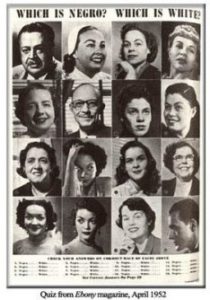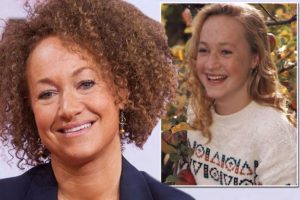Passing

This was actually in Ebony magazine in 1962, a gaming quiz.

Rachel Dolezal
(now – on the left and as a child on the right)
Passing over the years has been looked down upon by both White Americans and people of color due to the immorality of it. Passing as seen in the novel is used for gain, used for isolation(so Irene get a get a cup of tea at the Drayton Hotel) , used to deal with insecurities, as a way of life to live comfortably. Passing however is deeper than all of the reasons I have just stated, passing speaks on a culture, a generation, and possibly a millennium. For one to pass in the 1900’s educates people that the only way to live comfortably was to be White. Not only is that opressing but it causes people to cast themselves behind their true identity as a means of survival. Passing still goes on today which means not much as changed.
A modern case of passing is Nkechi Amare Diallo also known as Rachel Dolezal. Rachel is an American former civil rights activist who is most known for claiming to be a black woman while being of white-European ancestry and having no known black or African ancestry. This is actually an opposite case because it shows progression, now White Americans are passing to be African Americans for gain. Although this takes ten steps forward, it takes thirty steps backwards because this is another situation where someone chooses to live a life that is not their own, such as Clare Kendry or Gertrude which denies them of being themselves. The Guardian interview revealed that “White people painted Dolezal as mentally unstable, on the grounds that no normal white person would choose to call themselves black. But it was the wave of rage and mockery from the African American community that really stung”. It seems as wanting to be black is still undesired. Dolezal didn’t pass for gain but rather passed to use her voice as an advocate for Civil Rights for the NAACP. Dolezal states although she had a family member who could fund her or pay for her tuition she didn’t want the easy way out. Dolezal wanted to suffer, struggle, and work harder although her skin color allowed her privileges. Dolezal calls herself a “survivor” but she in reality caused her own battle.
Rachel however didn’t choose to be African American by choice but compared it to kids who”come out” as homosexuals saying she was somehow born in the wrong body. In the interview Dolezal is recorded saying she felt black at the age of 6 years old, although she was white she felt saw herself as a young black girl. Dolezal shares in the interview that she draw self portraits of herself using brown crayons. Dolezal’s case cannot be compared to Clare even if she ever got caught because Clare willingly admits that she did it for gain opposed to Dolezal.
Dolezal can also be noted for stating that she would do this all over again despite getting caught. Dolezal didn’t believe in a distinction of races but rather shares that we are all just human and that is the only race. The idea of educating or embracing based on distinction is explored in Audre Lorde’s essay “ Age, Race, Class, And Sex; Women Redefining Difference” .
Lorde brilliantly describes the teacher- student relationship of minorities or a sub group versus an inferior group, White Americans, racists, sexist etc. Lorde explains that although we as people are categorized by age, race , and sex the refusal to recognize these differences are what separates us. The reason I use a teacher and student relationship is because of Lorde’s description of the responsibility minorities have to explain or teach the inferior group of one’s humanity. Lorde states “I am responsible for educating teachers who dismiss my children’s culture in school. Black and Third World people are expected to educate white people as to our humanity. Women are expected to teach men. The oppressors maintain their position and evade responsibility for their own actions” (Lorde 115). Lorde sees that the oppressors use their ignorance as a shield, as a defense mechanism, they do not know better so they are like helpless students going around with wrong information until taught better. Lorde questions the “oppressors” who yell out their ignorances or dismiss her child’s culture, people who are oblivious to the lesbian and gays by treating them as they are less. Why is it that the oppressors need to be taught by the ones they are oppressing? Ignorance is somehow swept under the rug by the silence of the oppressed.
Lorde’s essay helps gain background knowledge on the characters in the novel, Passing and speak on society as well. Lorde expresses the oppressor to either be racist, sexist, but most importantly ignorant. John Bellew who is Clare Kennedy’s husband is a racist. Mr. Bellew enters the home greeting his wife by saying “Hello, Nig”(Larsen 200). Mr.Bellew who is oblivious to the fact that he is in a room with three African American females , 2 of which are secretly passing. Mr.Bellew doesn’t see anything wrong with his words or speaking on his hatred for Blacks, which he has never personally known but only heard stories of. Bellew states “ I draw the line at that. No niggers in my family. Never have been and never will be”(Larsen 201).Bellew makes clear that he will not tolerate any black person in his circle, in which he is aware of ofcourse. Bellew reveals that this “cute nickname” to his wife,Nig, is because of how dark she can get, than makes a joke, “ I tell her if she dont look out she’ll wake up one of these days and find out she’s turned into a nigger”(Larsen 201). John’s character represents the oppressor Lorde discusses and the three ladies who just consume this disrespect are represented as the oppressed. Instead of educating John like Lorde suggests, these ladies somehow allow it to continue. Lorde explains“ As members of such an economy, we have all been programmed to respond to the human differences between us with fear and loathing and to handle that difference in one of three ways: ignore it”(Lorde 115). It seems that the ignoring coping skill is the one that was possessed by the three ladies. Irene reacted with anger towards John but kept it internal. However Irene does wonder why she didn’t defend herself or why she allowed John to continue talking bad about Blacks but of course that would jeopardize her relationship with Clare and possibly expose Clare’s truths that she was Black.
Passing is only a result of treatment towards people of different race by society. If people were treated equally no race would want to be the other for gain or for the loss of basic rights.
Sources
Lorde, Audre. (1992). Age, Race, Class and Sex: Women Redefining Difference.
McGreal, Chris. “Rachel Dolezal: ‘I Wasn’t Identifying as Black to Upset People. I Was Being Me’” The Guardian. Guardian News and Media, 13 Dec. 2015. Web. 27 Apr. 2016.
Thomas J. Davis. “Identity in Passing: RACE-ING and E-RACE-ING in American and African American History.” The Journal of African American History, vol. 101, no. 3, 2016, pp. 344–355. JSTOR, JSTOR, www.jstor.org/stable/10.5323/jafriamerhist.101.3.0344.


